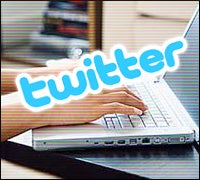 |
With usage soaring and third-party apps on the rise, Twitter has updated its terms of service to reflect the new ways people are using the service.
The company may have also provided a glimpse into its plans to edge toward profitability, with co-founder Biz Stone noting that the policy change does not rule out an ad-based revenue model.
“In the terms, we leave the door open for advertising,” Stone said in a blog post. “We’d like to keep our options open.”
He referred to comments he’d made previously about Twitter’s views on advertising and prospective business models, saying that Twitter is not categorically opposed to advertising, only that the idea of throwing banner ads up on people’s profile pages “isn’t interesting to us.”
Twitter is also looking into the idea of charging for commercial services as it works to develop a business model.
Stone also addressed the issue of ownership, which has been the source of occasional controversy in the world of Web-hosted user-generated content. Facebook ran into a privacy snarl when it updated its usage agreement in a way that appeared to assert perpetual ownership of users’ data, even after an account was closed.
Facebook quickly recanted and modified its policy, and has since made a series of overtures to its privacy-conscious users and policy makers.
Stone made it plain that Twitter has no intention of going down a similar path.
“Twitter is allowed to ‘use, copy, reproduce, process, adapt, modify, publish, transmit, display and distribute’ your tweets because that’s what we do,” he said. “However, they are your tweets and they belong to you.”
Stone said the update to the usage agreement was necessitated by the site’s ongoing evolution, aimed to “more appropriately reflect the nature of Twitter.”
What exactly that nature is is a slippery question. At a conference in Washington earlier this week, Twitter co-founder Jack Dorsey participated in a panel discussion where he was asked how he would define what that company does.
“I would consider us a utility,” Dorsey said. “We are building something that is equivalent to a grid.”
Dorsey’s view is that Twitter itself is a piece of infrastructure, like the electric grid or the Internet, where the real innovation comes from the devices and applications that are put to use on top of the network.
In that sense, Twitter’s evolution rests largely on its API, where third-party developers are invited to apply Twitter’s basic functionality to build off-site applications.
“Where we’re going is where the users take us,” he said.


